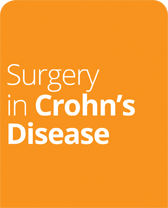Surgery in Crohn’s disease
As Crohn’s disease (CD) may affect any part of the gut, surgery is rarely curative. Careful endoscopic follow-up shows that after successful surgery 90% of cases develop further disease; over the following 10 years approximately 50% will need another operation. However, it is frequently possible to resect merely that part of the gut which has been affected by the disease, so that unlike Ulcerative Colitis (UC), surgery in CD does not inevitably mean a stoma.
Nevertheless, as surgery may remove parts of the gut which have important specialized functions, the follow-up of patients with CD after surgery must be very careful. Resection of the ileum may result in malabsorption of vitamin B12, leading to chronic fatigue, anaemia and damage to the brain and nervous system. Removal of the terminal ileum may result in failure to re-absorb bile salts, and this can cause diarrhoea. Sometimes removal of considerable sections of the small intestine leads to the so-called ‘short gut syndrome’ where the absorption of all nutrients is impaired and enteral or even intravenous feeding is required to maintain nutrition. Some cases of short bowel syndrome even require small bowel transplantation. It is clear that surgery should only be undertaken in CD when it is strictly necessary. Fortunately advances in the medical therapy of CD in particular nutritional therapy, have made extensive surgery rarely required.
The reasons for surgery in CD include failure to respond to medical therapy, but this is much less common than in UC. Surgery is more likely to be required for the development of strictures. This is discussed in detail in the section on complications of CD. Treatment with immunosuppressant drugs may lead to the formation of abscesses which must be drained, and fistulae which cause connections with other organs such as skin or bladder may need surgical removal. Perianal complications present a complex problem of surgical management (see section on complications of CD). Finally, the risk of bowel cancer is increased in CD as it is in UC, although this has been less apparent in the past as surgery, which removed potential sites for the development of cancer, was formerly much more frequent in patients with CD. Nevertheless the development of pre-malignant lesions is an indication for their removal.
Surgery to the small intestine
Following resection of the small intestine CD, the remaining bowel usually adapts to increase its absorptive capacity and should be possible to build back up to a normal diet. However, if there has been extensive surgery, the absorptive capacity will be reduced. A high calorie diet will be required to prevent weight loss and high energy drinks available on prescription may be helpful. In a few cases it may be necessary to supplement food with a special feed delivered via a fine tube into the stomach, or into the blood.If the terminal ileum is resected, Vitamin B12 may not be efficiently absorbed as the ileum is the only part of the gut where absorption of this vitamin takes place. The body has a large store of Vitamin B12 but when this has been used up regular Vitamin B12 injections will be required to prevent development of a type of anaemia. Folic acid may also be poorly absorbed if there has been extensive surgery to the small bowel and may need supplementation also to prevent anaemia.
The intestine's reserve capacity for fat absorption is more limited than that for carbohydrate or protein, and a reduction in dietary fat may be helpful. This will need to be replaced with carbohydrate- and protein-rich foods and occasionally a special form of easily absorbed fat known as medium chain triglyceride to prevent weight loss. If fat malabsorption continues, the fat soluble Vitamins - Vitamins A and D, and minerals - calcium and magnesium, may be at risk of depletion.

